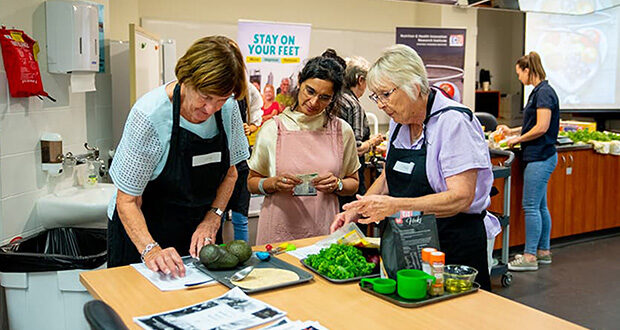A group of older Australians and a team of nutrition experts dove into the kitchen this month to explore the role of food and health in later life.
Researchers from Edith Cowan University and the Nutrition and Health Innovation Research Institute (NHIRI) organised the workshop to teach older people what to eat to improve muscle, bone and vascular health.
Malnutrition among older people is very common – over 70 per cent of people in residential aged care are estimated to be at risk of malnutrition or already malnourished.
Older people who don't receive enough vitamins and proteins through food are at a higher risk of frailty, falls, pressure sores and sarcopenia.
ECU's medical and health sciences professor, Marc Sim, said it was crucial to keep older people engaged with food and up to speed with the most current knowledge around nutrition.
"Eating well doesn't have to be difficult: it can be simple, quick and tasty while also allowing us to age in a healthy way," Dr Sim said.
"It's important we continue to learn about food and increase our understanding of nutrition, especially as we age."
Older Australians typically miss out on enough protein intake, especially in aged care.
Recent research found that people in aged care homes received only 25 per cent of their daily recommended protein.
Older people need, on average, four serves of dairy and two servings of 'meat', such as eggs, legumes, nuts and seeds.
Community-dwelling older Australians are also 50 per cent more at risk of malnutrition than the general population due to impaired food regulation that comes with age.
As we become older, we are less inclined to [want to] eat and more likely to feel full, even though the body might still need more nutrition to perform well.
Other factors, such as decreased mobility, living alone and the loss of a loved one, can hinder older Australians from cooking and preparing regular meals.
As a result, they tend to experience poorer health outcomes, including frequent bone fractures, delayed recovery from illness, and a higher risk of hospitalisation and mortality.
Dr Sim said the workshop encouraged older people to get into the kitchen and prepare nutritious meals to 'stay strong and active.'
"It's important that health research is accompanied by practical messaging to translate this for older people so they can implement this to their lives," he said.
"It's one thing to tell them what to eat; it's another to tell them why they need to eat these foods and how to prepare them."
During the workshop, people over 65 learned new recipes, such as beetroot pancakes, grilled fish tacos with kale slaw, and chocolatey cruciferous ice cream.
One attendee said she was surprised how vegetables could taste so diverse in different recipes.
Another participant said she learned new ways to reduce her cholesterol levels through her diet.
"I'm excited to find new ways to eat a wider variety of vegetables," she said.
"The camaraderie of the day was also excellent – everyone worked together to make interesting and tasty food.
"I loved the broccoli ice cream!"
Do you have an idea for a story?Email [email protected]
 Aged Care Insite Australia's number one aged care news source
Aged Care Insite Australia's number one aged care news source

